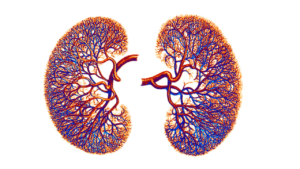When kidney function declines, it can severely affect overall health, leading to weak bones and a weakened body. Maintaining healthy kidney function is crucial to avoid these issues. In this article, we will introduce 5 effective ways to keep your kidneys healthy, from staying hydrated to monitoring salt and alcohol intake. These habits not only improve kidney function but also contribute to overall health protection.

- Stay Hydrated
Water helps transport essential nutrients to the kidneys and waste products to the bladder as urine. Insufficient hydration can lead to the kidneys’ filtration units (glomeruli) stopping their function, resulting in kidney stones and infections. Even mild dehydration can damage kidney function if it happens frequently. To keep your kidneys healthy, you should drink 4 to 6 glasses of water daily, but this amount may need to be increased if you are ill or have a fever. Impact of dehydration on kidney health is significant, and proper hydration is essential for kidney wellness.
- Regular Moderate Exercise
Exercise is not only essential for healthy individuals but also for those with kidney disease. Benefits of regular exercise for kidney health include enhanced muscle strength, boosted immune system, improved blood circulation, stabilized blood pressure, reduced blood fats (cholesterol and triglycerides), and promoted cardiovascular health. These factors are crucial for preventing kidney damage. Therefore, this healthy habit should be maintained consistently.
- Be Cautious with Alcohol
For healthy kidneys, consuming 1 or 2 glasses of alcohol is unlikely to harm their function. However, excessive consumption (more than 4 glasses in less than 2 hours) can suddenly cause severe kidney damage and may lead to long-term issues. Regular alcohol use can also cause dehydration, affecting kidney function, leading to weight gain, liver disease, high blood pressure, and other health problems. Understanding how alcohol affects kidney function can help you make better choices for your health.
- Monitor Salt Intake
Salt can affect the body in various ways. For some people, salt may increase protein levels in the urine, which can harm kidney function or worsen existing kidney conditions. A high-salt diet also raises the risk of high blood pressure (a common cause of kidney dysfunction) and kidney stones (which can cause pain and damage to the urinary tract if untreated). Effect of salt on kidney function is significant, and reducing salt intake can prevent complications.
- Screen for Kidney Disease
It is important to be aware of your risk factors for kidney disease. Risk increases if you or a family member has a history of cardiovascular disease, high blood pressure, diabetes, or family history of kidney failure. In such cases, doctors may recommend kidney function tests as part of routine health check-ups. Early detection makes kidney diseases easier to treat and potentially curable. Early signs of kidney disease and screening are crucial for timely intervention.
Weak kidney function not only leads to issues such as reduced male sexual health and urinary inconveniences like frequent urination or nocturia but also poses greater risks. Weak kidneys fail to nourish the bones, leading to long-term weakening of the body from the inside out, making recovery and improvement more challenging and causing quicker fatigue.
Therefore, doctors recommend focusing on improving kidney function as early as possible to maintain healthy kidneys and avoid diseases. You may want to explore natural remedies for weak kidneys such as “The Kidney Disease Solution,” a highly regarded approach that draws on scientific research from prestigious institutions including the University of Michigan, University of Queensland (Australia), McGill University (Canada), University of Bern, Institute of Biochemistry and Molecular Medicine, and The University of Tokyo. This solution helps reduce creatinine levels and increase GFR, aiding in strengthening and stabilizing kidney health, addressing weak kidney issues, and reducing future kidney complications.
If you’re interested, feel free to check it out!
Notes:
- Creatinine is a chemical waste product from muscle metabolism. Your kidneys filter creatinine from the blood and excrete it through urine. Blood creatinine levels are an important indicator of kidney function, as abnormal levels suggest impaired kidney function.
- GFR (Glomerular Filtration Rate) measures the rate at which the kidneys filter blood, that is, how much blood the kidneys can clean of waste and excess fluid in a given time, usually one minute. GFR is used to assess kidney function and diagnose kidney diseases. Normal GFR values vary by age, sex, and body size but typically range from 90-120 mL/min/1.73 m² for healthy adults.

